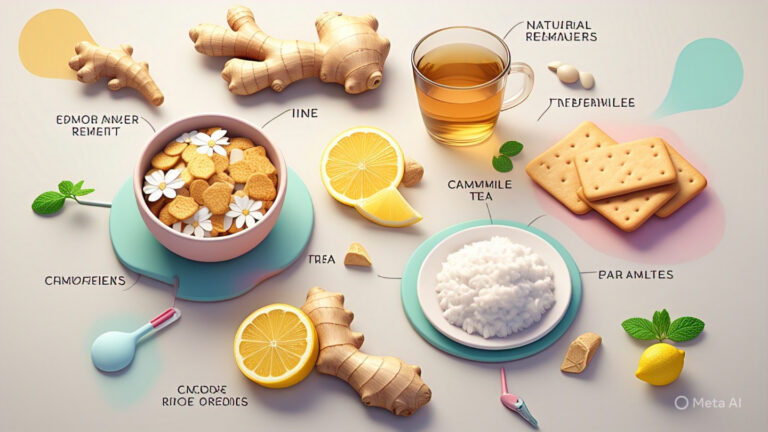Home Remedies For A Cold: Your Guide to Natural Relief in 2025
Estimated reading time: 10 minutes
Key Takeaways
- Home remedies offer natural, accessible relief for common cold symptoms.
- Simple solutions like hydration, honey, and steam inhalation can soothe discomfort.
- Backed by research from trusted sources, these methods support your body’s healing process.
- Safety is crucial—know when to seek medical help if symptoms worsen or persist.
Table of Contents
- Introduction: Why Home Remedies Are Your First Step
- The Science Behind Home Remedies
- Top 12 Home Remedies for a Cold
- Holistic Tips for Managing a Cold
- Safety First: Precautions and When to Seek Help
- Debunking Cold Myths
- Frequently Asked Questions (FAQs)
Introduction: Why Home Remedies Are Your First Step to Cold Relief
Feeling under the weather with a cold can drain your energy. The stuffy nose, scratchy throat, and endless fatigue are all too familiar, often leaving you searching for quick comfort. A common cold, caused by viruses, typically lingers for 7 to 10 days, bringing symptoms that disrupt your daily routine.
This is where home remedies step in as a gentle, natural choice. Easily accessible and often right in your kitchen, these solutions offer relief without breaking the bank. Think of warm teas or soothing soups that ease your discomfort while supporting your body’s healing.
At WikiHomeRemedies, we anchor our guidance in trusted research from sources like the NIH and WHO. Did you know adults catch 2 to 3 colds each year, as per WHO insights? Our mission is to equip you with safe, practical ways to find relief from home. Let’s explore actionable steps to soothe your symptoms and help you bounce back naturally in 2025. For related content on managing specific symptoms, check out our guide on sore throat remedies.
The Science Behind Home Remedies: How Natural Solutions Work
Home remedies aren’t just old family traditions; they often carry real benefits for easing cold symptoms. When you’re battling congestion or a sore throat, simple actions like staying hydrated help thin mucus, making it easier to clear out. Warm liquids, for instance, soothe irritation while supporting your body’s natural defenses.
Certain ingredients stand out for their healing properties. Take Vitamin C, packed with antioxidants—it plays a role in strengthening your immune response. Ginger, meanwhile, brings anti-inflammatory effects, helping to calm swelling in your airways and reduce discomfort. These elements don’t just mask symptoms; they assist your system in recovery.
Consider steam inhalation as another example. By moistening your nasal passages, it loosens stubborn mucus, letting you breathe with less effort. Research from trusted sources like the Mayo Clinic also points to honey as a powerful tool for calming coughs, thanks to its natural ability to coat and soothe the throat. At WikiHomeRemedies, we dive into these mechanisms to show you why nature’s offerings work. For more insights on relieving nasal congestion, see our detailed post on nasal congestion remedies.
Top 12 Home Remedies for a Cold: Practical and Proven Solutions
Navigating a cold can feel overwhelming, but these 12 remedies offer straightforward paths to relief. Each one comes with clear steps, reasons they help, and safety tips to keep in mind. Backed by insights from reputable sources, let’s walk through these natural solutions together.
3.1. Hydration (Water, Herbal Teas)
Staying hydrated is vital when a cold hits. Drinking plenty of water or warm herbal teas like chamomile thins mucus, easing congestion. It also keeps your throat from drying out, offering subtle comfort.
- Sip 8–10 glasses (2–2.5 liters) of fluids daily to maintain hydration.
- Choose warm options over cold drinks for added soothing effects.
- Try herbal teas with calming flavors to relax while you recover.
According to the Mayo Clinic, fluids are key to managing symptoms. However, steer clear of caffeinated drinks if you’re feeling dehydrated, as they might worsen things.
3.2. Honey for Cough and Sore Throat
Honey isn’t just sweet; it’s a natural balm for irritated throats. Its thick texture coats the throat, easing soreness, while its antibacterial traits help fend off minor infections.
- Stir 1–2 teaspoons into warm water or tea for a soothing drink.
- Take it straight off the spoon for quick cough relief at night.
- Use raw, unprocessed honey for the best natural benefits.
The NIH highlights honey’s strength in suppressing coughs, often outperforming some over-the-counter options. Remember, though, never give honey to children under 1 year due to the risk of botulism. For more on soothing throat irritation, explore our guide on inflamed throat remedies.
3.3. Ginger Tea for Congestion and Immunity
Ginger warms you from the inside, cutting through congestion with its sharp bite. Its anti-inflammatory nature reduces swelling in your airways, while boosting your body’s fight against the virus.
- Boil fresh ginger slices (1 inch or 2.5 cm) in 2 cups (500 ml) of water.
- Add a squeeze of lemon or honey for extra flavor and benefits.
- Drink 2–3 cups daily to keep symptoms in check.
Studies on PubMed note ginger’s bioactive compounds support immunity. Be cautious, though—too much might irritate your stomach, so start small if you’re new to it.
3.4. Steam Inhalation for Nasal Congestion
Breathing in steam can open up clogged nasal passages. The warm moisture loosens mucus, helping you clear it out and breathe with ease during a cold.
- Fill a bowl with hot water, just below boiling.
- Drape a towel over your head to trap the steam as you lean over.
- Inhale deeply for 5–10 minutes, taking breaks if needed.
Medical News Today endorses this method for temporary relief. Take care to avoid burns—keep your face at a safe distance from the hot water. For additional tips on clearing a stuffy nose, check out our related article on stuffy nose remedies.
3.5. Chicken Soup for Overall Relief
There’s truth to the comfort of chicken soup when you’re sick. Beyond hydration, it carries mild anti-inflammatory effects that can lessen the intensity of cold symptoms.
- Prepare a simple broth with chicken, vegetables, and light seasoning.
- Sip slowly while it’s warm to maximize the soothing warmth.
- Opt for homemade or low-sodium versions to control salt intake.
The Cleveland Clinic confirms soup can help with symptom relief. If you’re watching sodium for heart health, choose lighter recipes to stay safe.
3.6. Salt Water Gargle for Sore Throat
A quick salt water gargle can calm a scratchy throat. It reduces swelling and washes away bacteria, bringing a moment of respite from the pain.
- Mix ½ teaspoon of salt in 8 ounces (240 ml) of warm water.
- Gargle for 30 seconds, then spit—repeat 2–3 times daily.
- Ensure the water isn’t too hot to avoid irritation.
The Mayo Clinic supports this for throat relief. Just don’t swallow the mixture, as too much salt can upset your stomach. For more targeted solutions for severe throat pain, see our post on severe sore throat remedies.
3.7. Vitamin C-Rich Foods for Immune Support
Vitamin C gives your immune system a nudge to fight off a cold. Found in citrus fruits and peppers, it might even shave off a day of misery.
- Snack on oranges, kiwis, or bell peppers throughout the day.
- Add strawberries to your breakfast for a natural dose.
- Aim for 75–90 mg daily through food over supplements.
Cochrane reviews suggest Vitamin C can shorten cold duration. Be mindful not to overdo supplements, as excess can lead to digestive woes.
3.8. Zinc for Symptom Reduction
Zinc holds promise for trimming down how long a cold sticks around. If taken within the first 24 hours, it might dull symptom sharpness.
- Reach for zinc lozenges or syrup, following package doses (usually 10–15 mg).
- Pair with food to lessen stomach irritation if needed.
- Start as soon as symptoms appear for optimal impact.
Healthline references studies showing zinc’s benefit in early stages. Stick to recommended amounts—too much can harm over time.
3.9. Garlic for Antiviral Properties
Garlic packs a punch with allicin, a compound tied to immune support. While not a cure, it may bolster your body against viral colds.
- Crush 1–2 cloves and add to soups or warm water.
- Mix with honey if the raw taste feels too strong.
- Use in moderation to savor the benefit without overwhelm.
Verywell Health notes garlic’s long history in traditional care. Watch for stomach upset, though, as raw garlic can be intense for some.
3.10. Elderberry for Symptom Relief
Elderberry shines in lessening the grip of cold symptoms. Often taken as syrup or tea, it shows potential in easing severity and duration.
- Use store-bought elderberry syrup, adhering to dosage instructions.
- Brew dried elderberries into tea if you source them safely.
- Take daily during a cold for consistent support.
The Cleveland Clinic points to studies on elderberry’s helpful effects. Always check with a doctor before using pre-made products to ensure safety.
3.11. Rest and Sleep for Recovery
Your body mends fastest when you rest. Sleep lets your immune system focus on battling the virus, speeding up your comeback.
- Aim for 7–9 hours of sleep each night during illness.
- Nap if you feel worn out during the day.
- Create a quiet, dark space to encourage deep rest.
Harvard Health underlines sleep’s role in immunity. Dim lights and limit screen time before bed to help your body unwind.
3.12. Humidifiers for Dry Airways
A humidifier keeps the air moist, preventing your nasal passages from drying out. This aids breathing, especially in dry winter months.
- Place a cool-mist humidifier in your bedroom while you sleep.
- Set humidity levels between 30–50% for comfort.
- Clean the device daily to stop mold growth.
Medical News Today suggests humidity eases congestion. Neglecting to clean your unit, however, risks spreading germs, so stay diligent.
Holistic Tips for Managing a Cold at Home
Beyond specific remedies, a few broader habits can nurture your recovery from a cold. Your body thrives on thoughtful care, and small adjustments in daily life can make a noticeable difference. Let’s explore ways to support healing with balance and intention.
Start with nutrition that fuels recovery. Warm broths, fresh fruits, and vegetables deliver hydration and nutrients to keep your strength up. Avoid heavy, processed meals that might weigh you down—instead, lean into light, wholesome choices.
Managing stress also plays a quiet role in feeling better. A calm mind supports a resilient body, so take moments to breathe deeply or listen to soft music. Pair this with practical steps to stop the virus from spreading:
- Wash hands often with soap for at least 20 seconds.
- Cover your mouth with a tissue or elbow when sneezing.
- Keep shared spaces clean to protect loved ones.
If symptoms persist, over-the-counter aids like saline nasal sprays can offer a gentle boost—just use them sparingly to avoid dependency. Everyday Health notes that lifestyle tweaks often amplify natural healing. These habits, woven into your routine, pave a smoother path through a cold.
Safety First: Precautions and When to Seek Medical Help
While home remedies bring comfort, safety remains the cornerstone of care. Natural solutions are powerful, but they must be used with awareness to avoid unintended risks. At WikiHomeRemedies, we want you to feel secure as you explore these options.
Some ingredients, like herbs or honey, might trigger allergies in certain people. If you notice itching or swelling after trying a remedy, stop immediately. Special caution applies to children, the elderly, or those with chronic conditions—always tailor remedies to their needs.
Watch for signs that a cold needs more than home care. Seek a doctor if you spot these concerns:
- Fever climbing past 100.4°F (38°C) for over 3 days.
- Symptoms dragging beyond 10 days with no improvement.
- Severe pain, breathing trouble, or worsening cough.
Pregnant individuals or those with ongoing health issues should consult a healthcare provider before starting new remedies. The Mayo Clinic and WebMD stress that early medical input can prevent complications. Trust your instincts—if something feels off, don’t hesitate to reach out for professional guidance.
Debunking Cold Myths: What Doesn’t Work and Why
Misinformation about colds can steer you away from real relief. Let’s clear the air on a few widespread myths that often confuse people. With evidence as our foundation, we’ll uncover what truly helps.
One old saying, “feed a cold, starve a fever,” lacks any scientific grounding. Your body needs steady nutrition to fight illness, whether it’s a cold or fever—skipping meals only slows recovery. Another misconception is that antibiotics tackle colds. They target bacteria, not viruses, so they won’t touch cold symptoms, as the Mayo Clinic explains.
Some believe going outside with wet hair guarantees a cold. Truthfully, viruses spread through contact or droplets, not temperature alone. Focus on handwashing over worrying about damp hair. By sticking to proven methods, you avoid wasted effort and nurture healing with clarity.
Frequently Asked Questions (FAQs): Your Cold Queries Answered
Colds spark plenty of questions, and we’re here to shed light with clear answers. Let’s tackle some common concerns to help you navigate recovery with ease.
Can home remedies cure a cold completely?
No, home remedies don’t cure a cold since it’s viral and runs its course. They do, however, soothe symptoms like congestion or sore throat, making you feel better while your body heals. Think of hydration or honey as supportive allies, not total fixes.
What are the safest home remedies for children?
For kids, stick to gentle options like hydration with water or clear broths and extra rest. Honey can help coughs but only for those over 1 year due to botulism risks. Always check with a pediatrician for young ones, especially under 2, to ensure safety.
Which remedies work best for nasal congestion?
Steam inhalation and humidifiers directly target stuffy noses by moistening airways. Ginger tea also helps with its warming effect to loosen mucus. Start with steam for quick relief, using it safely to avoid burns.
Is ginger tea more effective than steam inhalation for congestion?
It depends on your needs—ginger tea warms internally and fights inflammation over time, while steam offers immediate mucus-loosening action. Combining both might yield the best comfort. Layer remedies to match how your symptoms feel each day.
These answers aim to guide you through natural relief. At WikiHomeRemedies, we’re committed to supporting your health with trusted, practical insights for 2025 and beyond.










